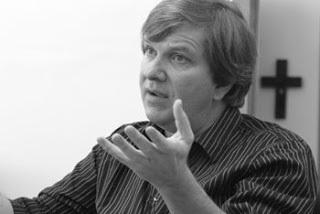
Father John Dear
By Charles Kiker
Rev. John Dear is a noted peace activist and author. He is a follower of the nonviolent way of Jesus. He has traveled worldwide, rubbed shoulders with numerous peace activists including the Dalai Lama, Desmond Tutu, and the Berrigan brothers. He is a student, via their works, of Ghandi and Martin Luther King, Jr. He is the author of numerous articles and books relating to peace, justice and nonviolence.
For several years he was the priest for several congregations in New Mexico. His persistent—Roman Catholic authorities called it obdurate—criticism of nuclear weapons and of those who build them resulted in his removal from New Mexico, with the result that now he is a priest without a parish. No, the nation, even the world is his parish.
Patricia and I were privileged to hear John Dear in Amarillo on May 16 at an event cosponsored by the Peace Farm and the Unitarian-Universalist Fellowship of Amarillo. At that event I purchased his most recent book, The Nonviolent Life, and since then I have worked my way through that short but heavy volume.
The book is divided into three sections—Part One: Nonviolence Toward Ourselves; Part Two: Nonviolence Toward all Others; and Part Three: Joining the Global Grassroots Movement of Nonviolence. Each section concludes with questions for personal reflection and small group discussion.
In Part One Rev. Dear makes the case that all nonviolence must begin with nonviolence toward ourselves. We cannot love others if we hate ourselves. The great commandment of Jesus is to love God with all our hearts and to love our neighbor as ourselves. And often we are filled with self-loathing. If we hate ourselves how can we love our neighbors? And if we hate our neighbors how can we love God? To cultivate nonviolence toward ourselves we need to acknowledge to ourselves the hurts and putdowns we have received. We need to acknowledge to ourselves our own self-worth. We don’t need to be afraid to pat ourselves on the back. Cultivating nonviolence toward ourselves is a daily lifelong attitude adjustment project.
If we are inwardly violent to ourselves it’s easy to turn our self-loathing outward and become mean and hateful to others. Peace and justice advocates, believing so strongly in their own cause, can become mean and hateful in the process and thus do more harm than good. I have to acknowledge that this strikes a sensitive nerve. I am not physically violent, but I can have a mean tongue and a meaner pen. Rev. Dear, along with the Epistle of James, reminds me to keep guard on that.
Becoming nonviolent to ourselves is not a one and done affair. It is a lifelong project. Rev. Dear returns to this topic throughout the book. Maybe it’s a problem for him, too?
Part Two emphasizes nonviolence toward all others, including God’s creation. This nonviolence is active, not passive. We don’t just roll over and play dead in the face of violence and injustice, but we do not return violence for violence. Glenn Stassen makes the case that turning the other cheek and walking the second mile shames the violent one in his violence. Dear emphasizes the environmental aspects of nonviolence. Raping the earth is violence. Brutality to animals is violence. (Rev. Dear is an advocate of vegetarianism). Working in industries which live off violence is participating in violence. After the session I had opportunity to speak with him briefly about this. I told him how so many of the young people in our church, in my church specifically, go into the military upon graduation from college. We are reminded to pray for them. I confessed that I am torn about this. I don’t say don’t pray for them, but neither do I want military service to be considered a badge of honor. He said, “Pray for them, but pray for the young people of Afghanistan too.” Pray for people who are subject to our drone strikes! Praying for our national “enemies” can be active nonviolence!
Some of us can become active in local organizations for peace and justice, such as Friends of Justice. We can witness impossible possibilities. I remember being at a meeting near the end of the trials of the Tulia Drug Sting victims. Everyone who went to trial had been convicted. Legal minds said it would be impossible to overturn the convictions. One woman whom I will not name jumped up and said, “No! We’re going to see that they all go free!” Within three years all those convictions were overturned.
Part Three regards becoming a part of the global movement toward nonviolence. Not all of us can be personally involved. But all of us can be advocates.
Meeting Rev. Dear has caused me to reexamine my own life, to try to be sure I’m not inwardly or outwardly violent, and to recommit myself as much as in me lieth to be a follower of the Way of the nonviolent Jesus.
